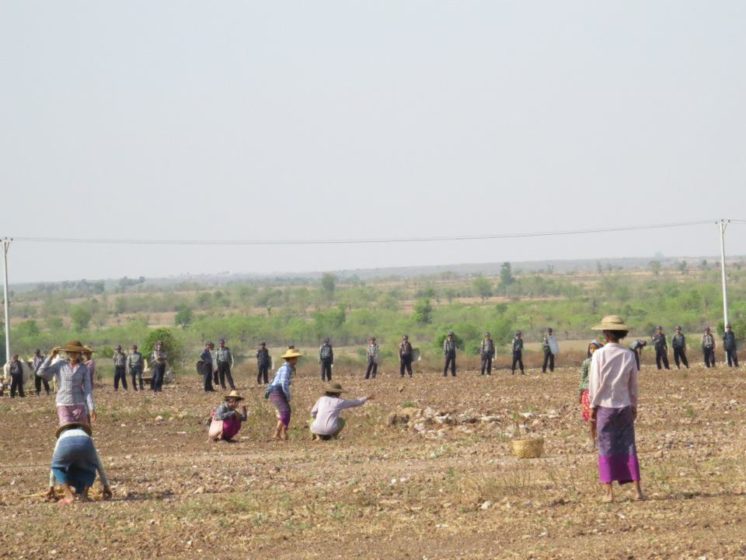Wanbao Mining promised it would consult with the Letpadaung communities surrounding its copper mine in Myanmar, as well as offering employment opportunities. However, in spite of these commitments, a series of forced evictions have taken place to make way for the company’s mining operations, leading to public protests.
 Photo: Burma Partnership / Flickr
Photo: Burma Partnership / FlickrWork started on the Letpadaung mine in the Monywa District of Myanmar in 2011 and the mine began producing copper in 2016.[1] The mine is operated by Myanmar Wanbao Mining Copper Limited (MWMCL), a subsidiary of Chinese-owned Wanbao Mining.[2] Wanbao Mining itself is owned by NORINCO, a Chinese state-owned conglomerate with interests in arms manufacturing as well as mining.[3]
The Letpadaung mine has been consistently linked to human rights impacts, including a series of forced evictions in 2011 that drew public protest and subsequent violent suppression of protesters.[4]
Originally, Myanmar Wanbao presented a comprehensive corporate social responsibility (CSR) plan, which included promises of employment and significant monetary compensation for every family that lost land to make way for the mine, as well as plans to consult with each community member.[5] Wanbao Mining has publicly claimed that it engaged sufficiently with community members and that “every villager impacted by the project had a direct one-on-one discussion with the Myanmar Wanbao leadership”.[6]
However, Amnesty International researchers found this not to be the case, and concluded that “the company [Myanmar Wanbao]’s claims are false, and that far from reaching all affected people, the consultations excluded many people affected by the land acquisition”.[7] Furthermore, internal documents from Myanmar Wanbao revealed that the company did not hold consultations as they claimed. In fact, documents show they only engaged with 1,032 of the estimated 16,694 people who would be impacted by the mine.[8]
An Amnesty International report on the Letpadaung mine concluded that “the deliberate exclusion of villages who may be the most adversely impacted by the project starkly demonstrates the chasm that exists between requirements for genuine consultation under international standards and the consultation processes”.[9] The same report also explained how the compensation provided by Myanmar Wanbao was less than the local price of land and was largely insufficient to provide for a family in a region where employment opportunities are scarce at best.[10]
At the same time as Myanmar Wanbao was emphasising its community commitment in its public communications in 2018 and 2019,[11] reports about protests against forced evictions[12] and fears about more relocations were emerging.[13] It seems that Wanbao Mining’s commitments have not translated into adequate consultation with or compensation for local people who have potentially lost their land and livelihoods as a result of the mine’s activities.
[1] Amnesty International, “Mountain of Trouble: Human Rights Abuses Continue at Myanmar’s Letpadaung Mine.” London: Amnesty International Ltd, 2017, p. 33. https://www.amnesty.org/download/Documents/ASA1655642017ENGLISH.PDF.
[2] Myanmar Wanbao,“About Us.” Accessed October 22, 2019. http://www.myanmarwanbao.com.mm/about-us/about-mwcml-mining.html?format=html&lang=en.
[3] Amnesty International, “Mountain of Trouble”, p. 10.
[4] Amnesty International, “Mountain of Trouble”, p. 26.
[5] Amnesty International, “Mountain of Trouble”, p. 13
[6] Amnesty International, “Mountain of Trouble”, p. 13.
[7] Amnesty International, “Mountain of Trouble”, p. 15; Cai, Feifei, Jialin Zhang, Jiyan Chen, and Jinfei Yue, “The Social Responsibility of China’s OFDI and NGOs’ Engagement: Taking the Myanmar Letpaduang Copper Mining Project as an Example.” Beijing: Social Resources Institute, July 2017. https://www.business-humanrights.org/sites/default/files/documents/SRI_The%20Social%20Responsibility%20of%20China%27s%20OFDI%20and%20NGOs%27%20Engagement.pdf.
[8] Amnesty International, “Mountain of Trouble”, p. 15.
[9] Amnesty International, “Open for Business?: Corporate Crime and Abuses at Myanmar Copper Mine.” London: Amnesty International Ltd, 2015, p. 26. https://www.amnesty.org/en/documents/ASA16/0003/2015/en/.
[10] Amnesty International, “Open for Business?”, p. 159.
[11] Myanmar Wanbao Mining Copper Limited. “Re: Response to RFA’s Report.” Business and Human Rights Resource Centre, January 12, 2018. ; Norinco Group. “Overseas Team Building Work,” April 23, 2019. http://www.norincogroup.com.cn/art/2019/4/23/art_126_155339.html (accessed October 22, 2019).
[12] Radio Free Asia. “Two Detained in New Letpadaung Min Protest in Myanmar,” March 29, 2018. https://www.rfa.org/english/news/myanmar/protest-03292018170435.html; Radio Free Asia. “Chinese-Backed Megaprojects in Myanmar Continue to Raise Ire of Residents,” December 14, 2017. https://www.rfa.org/english/news/myanmar/chinese-backed-megaprojects-in-myanmar-continue-to-raise-ire-of-residents-12142017171647.html.
[13] Slow, Oliver, Win Zar Ni Aung, and Ei Ei Mon. “Left behind by the Letpadaung Copper Mine.” Frontier Myanmar, June 5, 2019. https://frontiermyanmar.net/en/left-behind-by-the-letpadaung-copper-mine.
